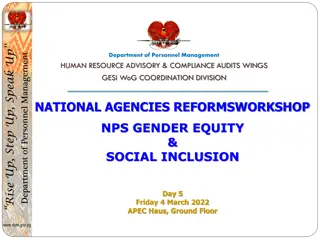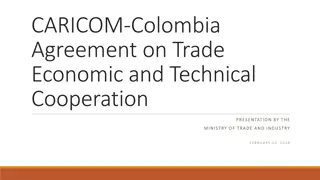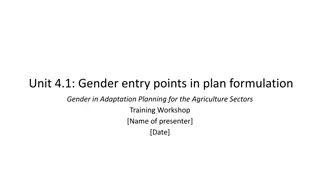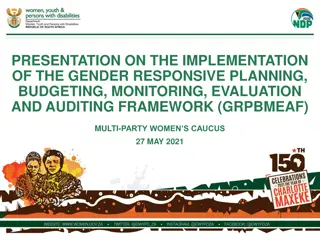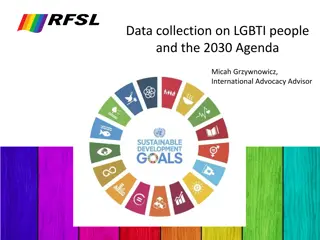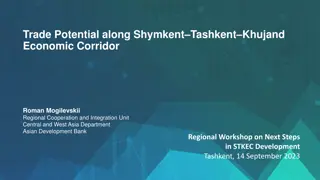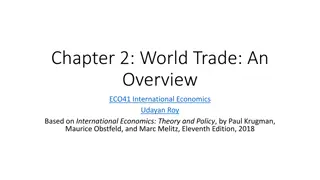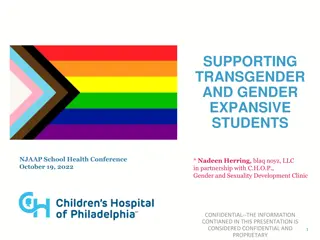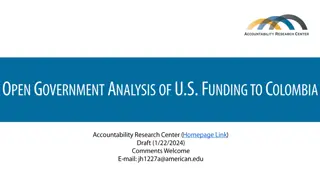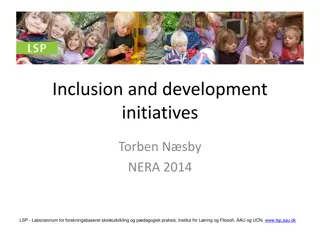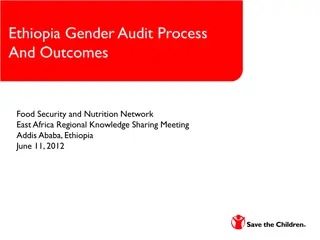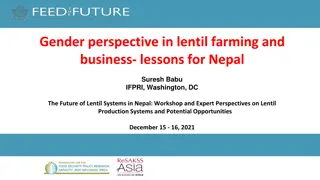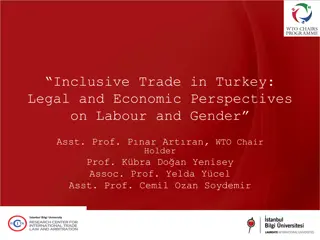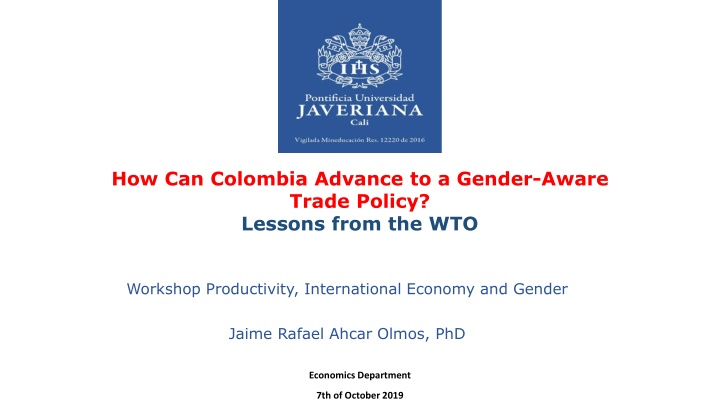
Colombia's Gender-Aware Trade Policy: Advancing Inclusion
Colombian trade policy's integration of gender provisions is analyzed, focusing on free trade agreements. Recommendations for gender perspective inclusion in trade negotiations are provided. The methodology involves reviewing WTO materials and RTAs to assess the treatment of gender perspectives.
Download Presentation

Please find below an Image/Link to download the presentation.
The content on the website is provided AS IS for your information and personal use only. It may not be sold, licensed, or shared on other websites without obtaining consent from the author. If you encounter any issues during the download, it is possible that the publisher has removed the file from their server.
You are allowed to download the files provided on this website for personal or commercial use, subject to the condition that they are used lawfully. All files are the property of their respective owners.
The content on the website is provided AS IS for your information and personal use only. It may not be sold, licensed, or shared on other websites without obtaining consent from the author.
E N D
Presentation Transcript
How Can Colombia Advance to a Gender-Aware Trade Policy? Lessons from the WTO Workshop Productivity, International Economy and Gender Jaime Rafael Ahcar Olmos, PhD Economics Department 7th of October 2019
Introduction: Importance and context Gender Inequality is paramount even across OECD countries. The unemployment rate gap in Colombia in August was 5.4%, one of the highest in the world. Examining the proportion of seats held by women in national parliaments for OCDE countries in 2018: The median rate was 28.7% The best result, near perfect equality was found in Mexico 48.2%. In Colombia, 18.1%, is one standard deviation below the mean. Spain, culturally close to Colombia, showed a 39.1% rate. Sources: DANE (2019) and World Bank (2019)
Objectives Research Question Is Colombia integrating gender provisions into its trade liberalization agreements? Our main goal is to determine the extent of the inclusion of gender provisions in Colombia s free trade agreements. Provide recommendations on the best way to include gender perspective on the agenda of trade liberalization negotiations, and in the body of regional trade agreements.
Methodology I will analyze the presentations available on the WTO web site related to the WTO 28thMarch 2019 Workshop on Gender Considerations in Trade Agreements . The WTO shares with the public materials from 7 out of the 15 presentations that took place on the event concerning the interventions of experts on the topic of gender and free trade agreements. I will comment the central points of each presentation to make a synthesis of the author s contributions. Based on this work I will suggest recommendations and actions that would contribute to the inclusion of gender provisions and commitments on free trade agreements. I will then review Colombia s RTAs to examine provisions that include an explicit reference to gender topics, in order to define to what extent the gender perspective is being treated.
Table 1 Percentage of WTO non-traditional provisions in RTA. (%) . 1980-2012. Provisions Provisions % % Competition policy Trade-Related Investment Measures Intelectual Property Rights Capital flows Environmental Laws Agriculture Regional Cooperation Visa Waiver and Asylum Labor Market Regulation Research and Technology Education and Training Energy Industrial Cooperation Cultural Cooperation Social Subjects Consumer Protection Information Technology Anti-Coruption Policy Financial Assistance 67% 65% 58% 57% 45% 31% 30% 30% 29% 29% 24% 24% 21% 20% 20% 18% 18% 17% 17% Small and Medium Enterprises Legal Convergence Human Rights Political Dialogue Statistics Data Protection Illicit Drogs Illegal Immigration Audiovisual and Media Economic Policy Dialogue Money Laundering Health Mining Explotation Fiscalit Government procurement Terrorism Politiques d'innovation S curit nucl aire Gender Inequality SMEs 17% 15% 13% 13% 13% 12% 12% 11% 10% 10% 10% 8% 8% 8% 5% 5% 3% 3% <10% Source: Ahcar (2017) based on Horn et al (2010)
What is the WTO doing to improve the role of women in trade? 1) Working to raise awareness on the link between trade and gender; 2) Facilitating WTO members' action on trade and gender; 3) Generating new data on the impact of trade on women; 4) Providing training to government officials and to women entrepreneurs. Source: https://www.wto.org/english/tratop_e/womenandtrade_e/womenandtrade_e.htm
WTO Technical assistance The WTO's Technical Assistance plan 2018-2019 includes a section on gender, providing a mandate for the WTO to develop a training module on trade and gender. The objective of the module is to focus "on trade policy with the aim to raise awareness and enhance the aptitude of policy makers to incorporate gender considerations in their analysis and trade policy development or negotiations (WTO, 2019) Source: https://www.wto.org/english/tratop_e/womenandtrade_e/womenandtrade_e.htm
Discussions and lessons from the Workshop on Gender Discussions and lessons from the Workshop on Gender Considerations Considerations in Trade Agreements . in Trade Agreements . Geneva (WTO), March 28 Geneva (WTO), March 28th th, 2019. , 2019. Jaime de Melo. Fondation pour les tudes et recherches sur le d veloppement international Carolyn Rodrigues Birkett. FAO David Luke. UN - African Trade Policy Centre (ATPC) Simonetta Zarrill. UNCTAD Jos -Antonio Monteiro, WTO Ignacia Simonetti. Gender Department, Ministry of Foreign Affairs of Chile. Andre Francois Giroux. Trade Agreements Secretariat, Global Affairs Canada.
Jaime Jaime de Trade Facilitation Agreement. de Melo Melo. Remarks on Gender in the Gender neutral RTAs cause gender outcomes because of its effects related to changes in taxation. Differences in consumption and employment. RTAs to address market failures as gender inequality. Thus, RTAs can conduit the intention of one partner to impose its superior standards/regulations. The Trade Facilitation Agreement (TFA) 2017, has the commitment to address gender issues, especially through the Trade Facilitation Support Program that provides funds for developing countries.
Carolyn Rodrigues Birkett. Carolyn Rodrigues Birkett. Reflections on new ideas on Gender in Trade agreements: FAO s perspective. Gender provision found in 13% of the 556 RTAs analyzed. These provisions are largely aspirational and mostly identified as a cooperation area. Weak enforceability . RTA with proactive and mitigating measures needed to deal with women s poor socioeconomic conditions in rural areas. Incorporating strong and enforceable gender-related provisions in new or renegotiated trade agreements . Five priority areas: 1) Increasing women's employment opportunities, 2) Fostering women's empowerment, 3) Reducing gender pay gap, 4) Improving occupational health and safety, 5) Addressing sexual harassment and gender-based violence. FAO - Principles for Responsible Investment in Agriculture and Food Systems. Ensure that women are receiving the benefits.
David Luke. UN - African Trade Policy Centre (ATPC) The African Continental Free Trade Agreement (AfCFTA) do not include gender provisions or commitments. 44 Countries. Into force for 23 countries in May 30th, 2019. Gender equality could be addressed: Directly: in the Preamble, The General Objective, in the Technical Assistance section, or in the Capacity Building and Cooperation section. Indirectly: Trade facilitation, Customs cooperation, Sensitive goods and exclusion list, Rule of origin and services.
Simonetta Zarrill. Gender Considerations in RECs: The Cases of EAC and MERCOSUR Mercosur (1991) Gender Equality policies are unrelated with this RTA EAC (2000) No detailed provision or chapter on gender. In 2017 a Gender Equality and Development Bill. In 2018: Gender Policy. https://www.eac.int/press-releases/146-gender,- community-development-civil-society/1217-eac-launches-gender-policy Different levels of commitment, lack of gender data, difficulty to measure the effects on gender related outcomes of the inclusion of gender provisions in RTAs.
Jos-Antonio Monteiro. Gender-related Provisions in RTAs. Cooperation provisions are the most common gender-related provisions with gender-based labour discrimination being the most common cooperation area Source: Jos -Antonio Monteiro (2019)
Andre Francois Giroux. Integrating Women in International Trade: The Canadian Approach. A whole-of-government approach to incorporating gender lens in all policymaking Gender is a key part of Canada s Inclusive Approach to Trade. Extensive collection and analysis of gender disaggregated data Extensive consultations and a Gender Based Analysis Plus Helps identify new opportunities for mainstreaming new gender responsive and inclusivity provisions in FTAs through consistent and regular updating of GBA+ of FTA chapters before each round of negotiations .
Ignacia Simonetti. Gender Considerations in Trade Agreements. Chile is making headway with gender provisions. Trade leads to more opportunities for woman Trade policy can increase women participation generating positive spillovers, as economies with better opportunities for women are more competitive. Low participation of woman 4.2%, leading export companies in Chile. This link to the amendment in 2017 of the CHL-CAN RTA show us how this provisions look like: http://www.sice.oas.org/Trade/chican_e/Amendments_06_2017/CAN_CHL_Agt_Amend_Apdx_2_Ch_N_bis_e.asp
Gender Provisions in Colombias RTA Colombia have 15 RTA in force. Recent agreements with Canada, United States, The EU, EFTA and South Korea are comprehensive (deep) compared with international standards. However, mentions to gender inequality reduction commitments (A Gender Provision) are practically non-existent.
Conclusion Gender Inequality is present in multilateral trade discussions thanks to relatively recent commitment from the WTO. MC11: The Buenos Aires 2017 declaration on Women and Trade. Little research or scientific papers have been published on the inclusion of gender provisions in RTA. Colombia s trade policy must evolve to include gender inequality reduction provisions in future RTAs, or if reviewing existing ones, as a commitment to reduce gender inequality through fair trade relationships. As a benchmark, we can follow the steps of Canada and Chile.
References Ahcar, J. & Siro n, J-M (2017). Deep Integration: Considering the heterogeneity of free trade agreements. Journal of Economic Integration, 32(3), 615-659. DANE (2019) Bolet n T cnico: Gran Encuesta Integrada de Hogares (GEIH). 30 de septiembre de 2019. Recuperado en https://www.dane.gov.co/files/investigaciones/boletines/ Horn, H., Mavroidis, P. C. & Sapir, A. (2010). Beyond the WTO? an anatomy of EU and US preferential trade agreements , The World Economy, 33(11), 1565-1588. Banco Mundial (2019) Indicadores del desarrollo mundial. Proporci n de esca os ocupados por mujeres en los parlamentos nacionales (%). Recuperado de: https://datos.bancomundial.org/indicador WTO (2017) Gender Aware Trade Policy: A Springboard for women s Economic Empowerment. Pp. 1-8. Retrieved From www.wto.org
References Jaime de Melo. Fondation pour les tudes et recherches sur le d veloppement international (2019, March 28) Remarks on Gender in the Trade Facilitation Agreement (TFA). Workshop on Gender Considerations in Trade Agreements celebrated by the World Trade Organization (WTO) in Geneva, Switzerland. Carolyn Rodrigues Birkett. FAO, (2019, March 28) Reflections on new ideas on Gender in Trade agreements: FAO s perspective. Workshop on Gender Considerations in Trade Agreements celebrated by the World Trade Organization (WTO) in Geneva, Switzerland. David Luke. UN - African Trade Policy Centre (ATPC) and the Economic Commission for Africa (ECA). (2019, March 28). Gender considerations in FTAs, regional integration agreements and preferential trade schemes. Workshop on Gender Considerations in Trade Agreements celebrated by the World Trade Organization (WTO) in Geneva, Switzerland. Simonetta Zarrill. UNCTAD DITC (2019, March 28). Gender Considerations in RECs: The Cases of EAC and MERCOSUR. Trade, Gender and Development. Workshop on Gender Considerations in Trade Agreements celebrated by the World Trade Organization (WTO) in Geneva, Switzerland. Jos -Antonio Monteiro, WTO, (2019, March 28). Gender-related Provisions in Regional Trade Agreements. Workshop on Gender Considerations in Trade Agreements celebrated by the World Trade Organization (WTO) in Geneva, Switzerland. Ignacia Simonetti. Gender Department, Ministry of Foreign Affairs of Chile. (2019, March 28). Gender Considerations in Trade Agreements. Workshop on Gender Considerations in Trade Agreements celebrated by the World Trade Organization (WTO) in Geneva, Switzerland. Andre Francois Giroux. Trade Agreements Secretariat, Global Affairs Canada. (2019, March 28) Integrating Women in International Trade: The Canadian Approach. Workshop on Gender Considerations in Trade Agreements celebrated by the World Trade Organization (WTO) in Geneva, Switzerland. Poletti-Hughes, J. & Briano-Turrent, G. (2019) Gender diversity on the board of directors and corporate risk: A behavioural agency theory perspective. International Review of Financial Analysis, vol. 6, p. 80-90.


